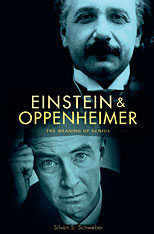
Albert Einstein and J. Robert Oppenheimer, two iconic scientists of the twentieth century, belonged to different generations, with the boundary marked by the advent of quantum mechanics. By exploring how these men differed—in their worldview, in their work, and in their day—this book provides powerful insights into the lives of two critical figures and into the scientific culture of their times. In Einstein’s and Oppenheimer’s philosophical and ethical positions, their views of nuclear weapons, their ethnic and cultural commitments, their opinions on the unification of physics, even the role of Buddhist detachment in their thinking, the book traces the broader issues that have shaped science and the world.
Einstein is invariably seen as a lone and singular genius, while Oppenheimer is generally viewed in a particular scientific, political, and historical context. Silvan Schweber considers the circumstances behind this perception, in Einstein’s coherent and consistent self-image, and its relation to his singular vision of the world, and in Oppenheimer’s contrasting lack of certainty and related non-belief in a unitary, ultimate theory. Of greater importance, perhaps, is the role that timing and chance seem to have played in the two scientists’ contrasting characters and accomplishments—with Einstein’s having the advantage of maturing at a propitious time for theoretical physics, when the Newtonian framework was showing weaknesses.
Bringing to light little-examined aspects of these lives, Schweber expands our understanding of two great figures of twentieth-century physics—but also our sense of what such greatness means, in personal, scientific, and cultural terms.
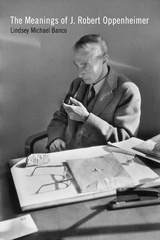
The Meanings of J. Robert Oppenheimer examines how he has been represented over the past seven decades in biographies, histories, fiction, comics, photographs, film, television, documentaries, theater, and museums. Lindsey Michael Banco gathers an unprecedented group of cultural texts and seeks to understand the multiple meanings Oppenheimer has held in American popular culture since 1945. He traces the ways these representations of Oppenheimer have influenced public understanding of the atomic bomb, technology, physics, the figure of the scientist, the role of science in war, and even what it means to pursue knowledge of the world around us. Questioning and unpacking both how and why Oppenheimer is depicted as he is across time and genre, this book is broad in scope, profound in detail, and offers unique insights into the rise of nuclear culture and how we think about the relationship between history, imagination, science, and nuclear weapons today.
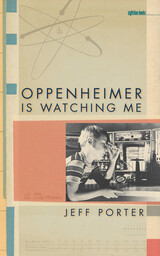
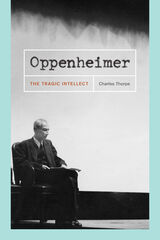

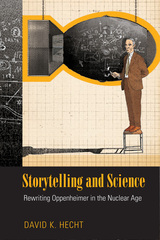
READERS
Browse our collection.
PUBLISHERS
See BiblioVault's publisher services.
STUDENT SERVICES
Files for college accessibility offices.
UChicago Accessibility Resources
home | accessibility | search | about | contact us
BiblioVault ® 2001 - 2024
The University of Chicago Press









